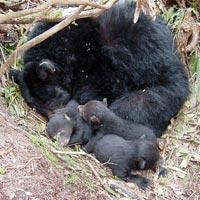Animals adopt varying techniques to get through long days of winter
A group of black bears hibernate together. Bears burn up their stored fat slowly while hibernating. (Photo by the National Park Service via Wikimedia Commons.)
The longest day of the year has just passed. But for humans and animals, the fight to survive the long cold winter is far from over.
Donna Fernandes, a zoologist and president of the Buffalo Zoo, says animals respond to the decreasing day length and colder temperatures by adopting one of three strategies.
“They can migrate, just leave the area completely; hibernate; or they can develop certain characteristics that make them able to resist the cold much better,” she said.
In the winter, humans may have a hard time getting out of bed when the days are darker and colder, Fernandes says, while bears choose to sleep through winter.
“(Bears) spend about 100 days in their den without eating anything, in a sort of semi-sleeping state. And not only do they not eat, but they lower their body temperature by several degrees, and their metabolic rate decreases to about half the normal rate,” she said.
The advantage of these changes, Fernandes says, is lower body temperature and metabolic rate allows them to consume fewer calories. Bears burn up stored fat much more slowly, which enables them to survive without eating.
But even when bears are in hibernation, if woken up they are still capable of retreating or attacking, Fernandes said. But other hibernating animals like ground squirrels, chipmunks and other rodents, go into a comatose state by lowering their body temperature to a few degrees above freezing with a metabolic rate 10 percent of the normal rate, she says.
Another winter coping mechanism is migration. In the United States and Canada migration is a common strategy among birds with two-thirds migrating south for the winter.
Other migrating animals are bats and larger mammals like caribou or reindeer, Fernandes said.
“In the past we had huge herds of bison or American buffalo, and they used to migrate great distances. And probably a very well known group is whales, who will migrate from north to south in the winter,” she said.
But for animals unable to hibernate or migrat,e like fish who live in ponds or small aquatic invertebrates like toads, Fernandes says the biggest problem they face is how to avoid freezing. In response they produce a chemical in their blood called glycerol she says, similar to antifreeze.
“It lowers the freezing temperature of their body tissues, which is composed primarily of water. And by having antifreeze, or this glycerol in their body, their cells won’t burst,” she said.
And though humans tend to pack on the pounds during the winter, animals use the extra pounds for good reason — as insulation.
“I think in humans, we gain weight not because we want greater insulation — we’re escaping the release of having to look good in a bathing suit,” she said. “I think we allow ourselves to get a little heavier in the winter because we don’t have to look so good any more.”
